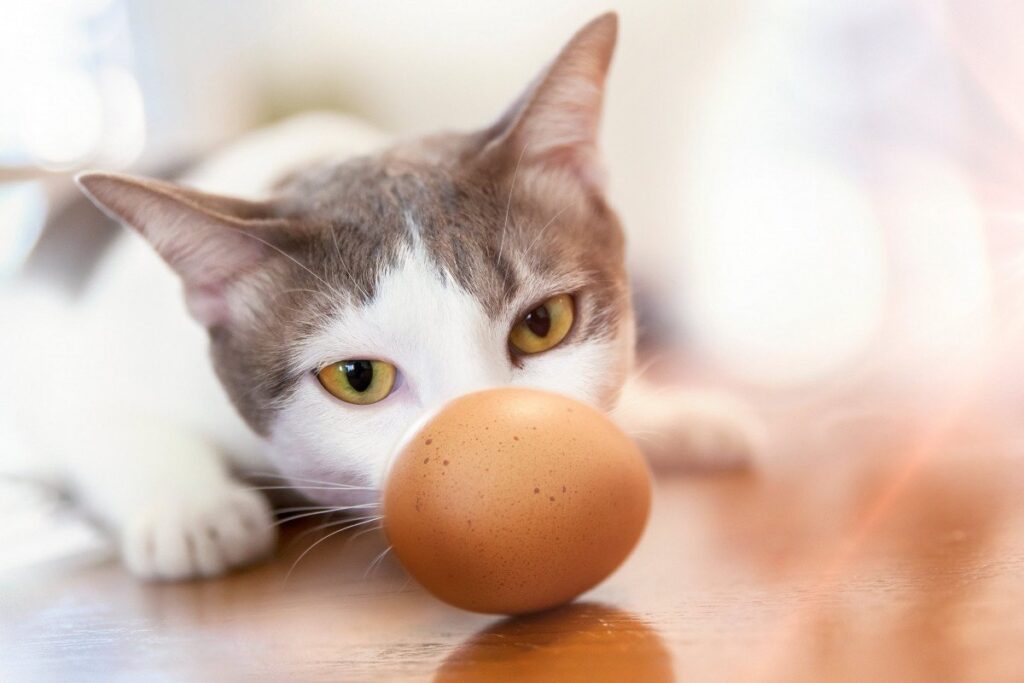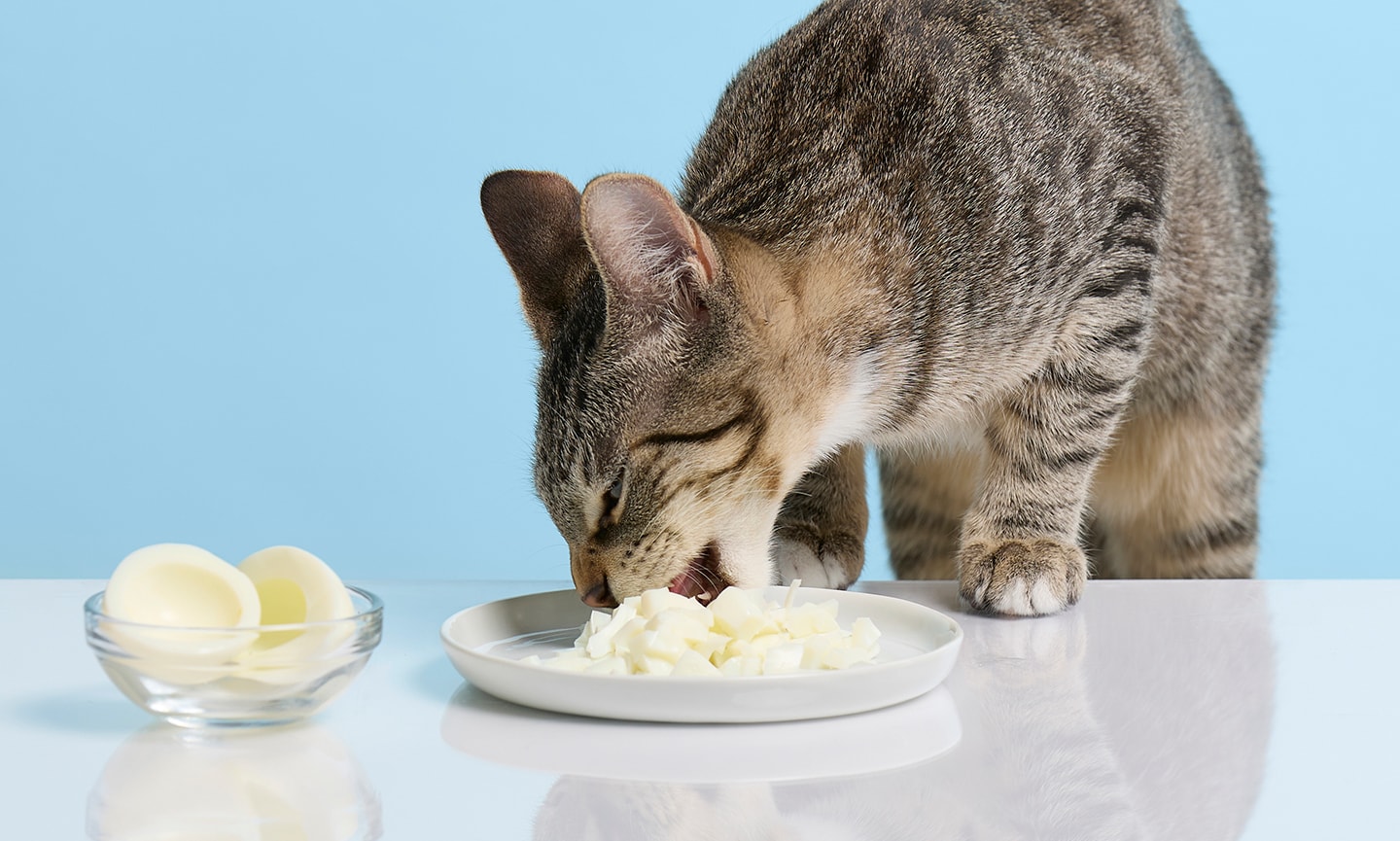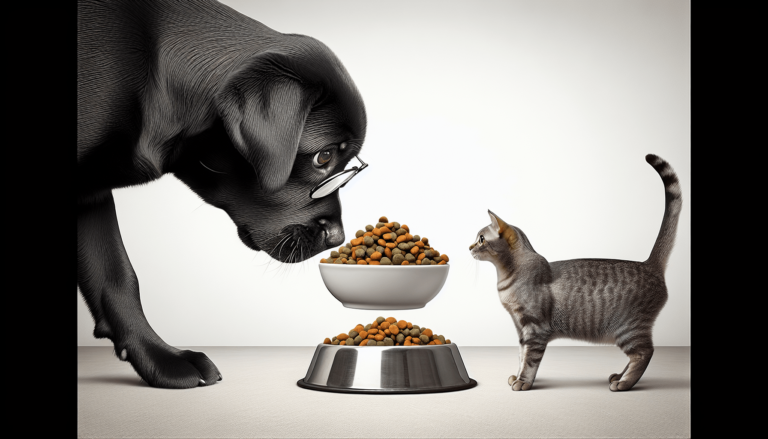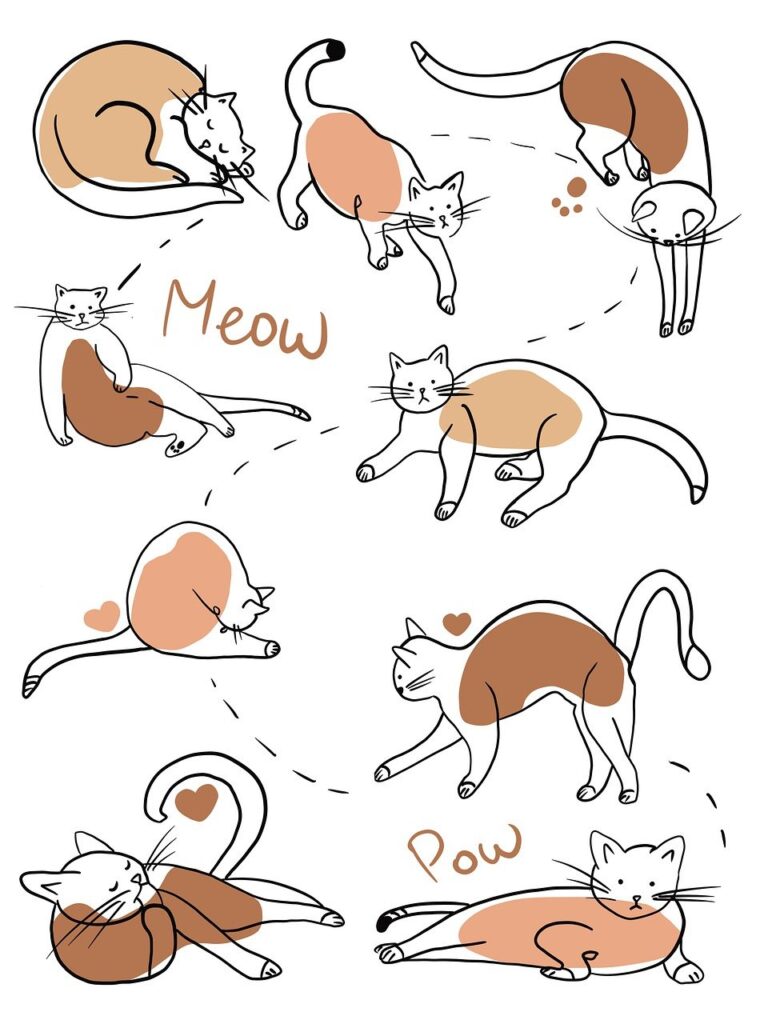Can Cats Eat Eggs
Have you ever wondered if it’s safe for your feline friend to indulge in a little eggy treat? Well, the answer is yes – cats can indeed eat eggs! Eggs are a fantastic source of protein and essential nutrients that can benefit your cat’s overall health. However, there are a few important factors to consider before cracking open that egg carton. From cooking methods to portion sizes, let’s explore the ins and outs of feeding eggs to your beloved cat.
Understanding Feline Nutrition
Cats are obligate carnivores, which means they have specific dietary requirements that need to be met in order for them to thrive. Understanding feline nutrition is crucial for providing your cat with a healthy and balanced diet. This article will guide you through the significance of proteins, the importance of taurine, the role of fats, carbohydrate requirements, and the importance of vitamins and minerals in a cat’s diet.
Significance of Proteins
Proteins play a vital role in a cat’s diet as they are the building blocks of their body. They are essential for the growth and repair of tissues, and they also provide energy. Cats have a higher protein requirement compared to other animals due to their unique metabolism. Protein sources should be of high quality and easily digestible to ensure that cats are getting the necessary nutrients.
Importance of Taurine
Taurine is an amino acid that is essential for cats. Unlike other animals, cats cannot synthesize enough taurine in their bodies, so it must be obtained through their diet. Taurine is particularly important for maintaining healthy heart function, vision, and reproductive health in cats. A deficiency in taurine can lead to serious health issues, including heart disease and vision problems.
The role of Fats
Fats provide a concentrated source of energy for cats and are necessary for the absorption of fat-soluble vitamins. They also play a role in maintaining healthy skin and coat, promoting brain development, and supporting the immune system. It is important to ensure that the fats in a cat’s diet come from high-quality sources and are balanced with other nutrients.
Carbohydrate requirements
Cats have a limited ability to digest and metabolize carbohydrates compared to other animals. Their bodies are designed to primarily use proteins and fats for energy. While cats can obtain some energy from carbohydrates, it is not an essential component of their diet. A high-carbohydrate diet can lead to various health issues in cats, including obesity and diabetes.
Vitamins and minerals
Vitamins and minerals are essential for a cat’s overall health and well-being. These micronutrients play a crucial role in supporting various bodily functions, including the immune system, bone health, and metabolism. It is important to provide a balanced diet that includes a variety of nutrient-rich foods to ensure that cats are getting an adequate intake of vitamins and minerals.
Eggs as a Protein Source
Eggs are a good source of protein and can be a healthy addition to a cat’s diet. They provide a complete and easily digestible source of protein, making them an excellent option for fulfilling a cat’s protein needs. However, it is important to consider the quality of egg protein, the amino acid profile of eggs, and the difference between egg whites and egg yolks.
Quality of Egg Protein
Egg protein is considered to be a high-quality protein source. It contains all the essential amino acids that cats need for optimal health. The protein in eggs is highly bioavailable, meaning that it is easily absorbed and utilized by the body. This makes eggs a valuable protein source for cats.
Amino Acid Profile of Eggs
The amino acid profile of eggs is beneficial for cats. Eggs contain a balanced ratio of essential amino acids, including taurine, which is crucial for cats’ health. Taurine deficiency can lead to serious health problems in cats, so including eggs in their diet can help ensure they are getting an adequate supply of this important amino acid.
Egg Whites vs. Egg Yolks
Both egg whites and egg yolks can be included in a cat’s diet, but it is important to consider their differences. Egg whites are primarily composed of protein and are low in fat, while egg yolks contain fats, vitamins, and minerals. It is important to note that egg yolks should be cooked thoroughly to avoid the risk of salmonella contamination.
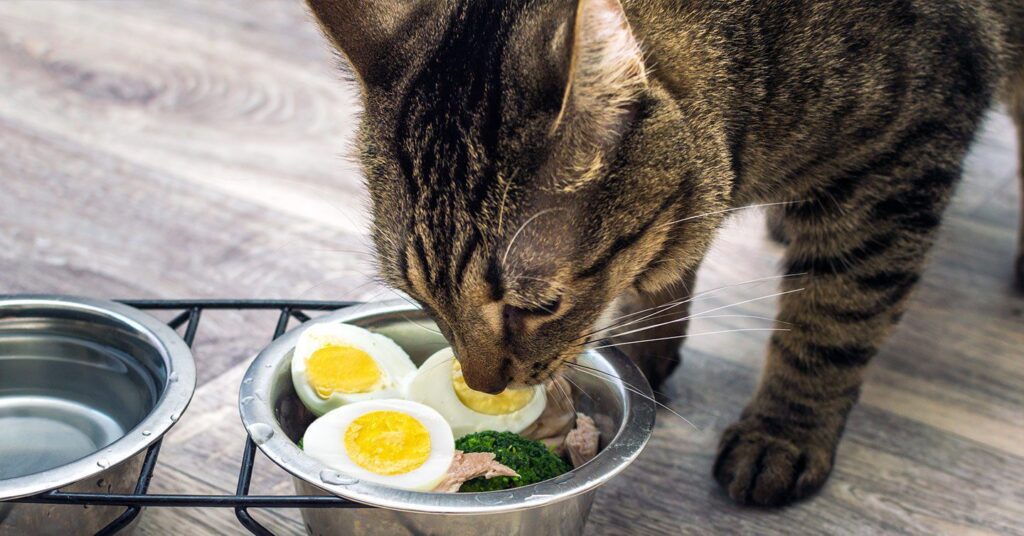
Cooked vs. Raw Eggs
When considering feeding eggs to your cat, it is important to understand the benefits and concerns associated with both raw and cooked eggs.
Raw Egg Benefits
Some pet owners choose to feed raw eggs to their cats because they believe it provides a more natural and nutrient-dense option. Raw eggs are a rich source of enzymes, vitamins, and minerals that may be beneficial for a cat’s overall health. They are also easier to digest for some cats.
Cooked Egg Benefits
Cooked eggs provide a safer option for feeding cats. Cooking eggs helps to eliminate the risk of salmonella contamination, which can be harmful to both cats and humans. Additionally, cooking eggs can enhance the digestibility of proteins and make them easier for cats to absorb.
Concerns with Raw Eggs
Feeding raw eggs to cats carries the risk of salmonella contamination. Salmonella is a bacteria that can cause foodborne illness in both cats and humans. While cats are generally more resistant to salmonella than humans, it is still a concern that should be addressed. It is important to handle raw eggs safely and ensure that they are fresh and sourced from reputable sources.
Safe Cooking Methods
If you choose to feed your cat cooked eggs, it is important to use safe cooking methods. Eggs should be cooked thoroughly to eliminate the risk of salmonella contamination. It is recommended to fully cook the egg until both the white and the yolk are firm. Avoid adding any seasonings, oils, or butter to the eggs, as these can be harmful to cats.
The Eggshell Consideration
When serving eggs to cats, it is worth considering the benefits and potential concerns associated with including eggshells in their diet.
Benefits of Eggshells
Eggshells can provide a natural source of calcium for cats. Calcium is essential for maintaining strong bones and teeth, ensuring proper nerve and muscle function, and supporting blood clotting. Including eggshells in a cat’s diet can help meet their calcium requirements.
How to Safely Serve Eggshells
To safely serve eggshells to cats, it is important to prepare them properly. Start by rinsing the eggshells thoroughly to remove any residual egg white or yolk. Then, boil the eggshells in water for around 10 minutes to kill any potential bacteria. Once boiled, allow the eggshells to cool before grinding them into a fine powder using a blender or coffee grinder. The powder can be sprinkled onto your cat’s food, ensuring they consume the necessary calcium.
Possible Concerns
While eggshells can provide a natural source of calcium, it is important to be cautious and avoid over-supplementing. Too much calcium can lead to health issues, including urinary tract problems. Consult with your veterinarian to determine the appropriate amount of eggshell powder to add to your cat’s diet to ensure they receive the right balance of calcium.
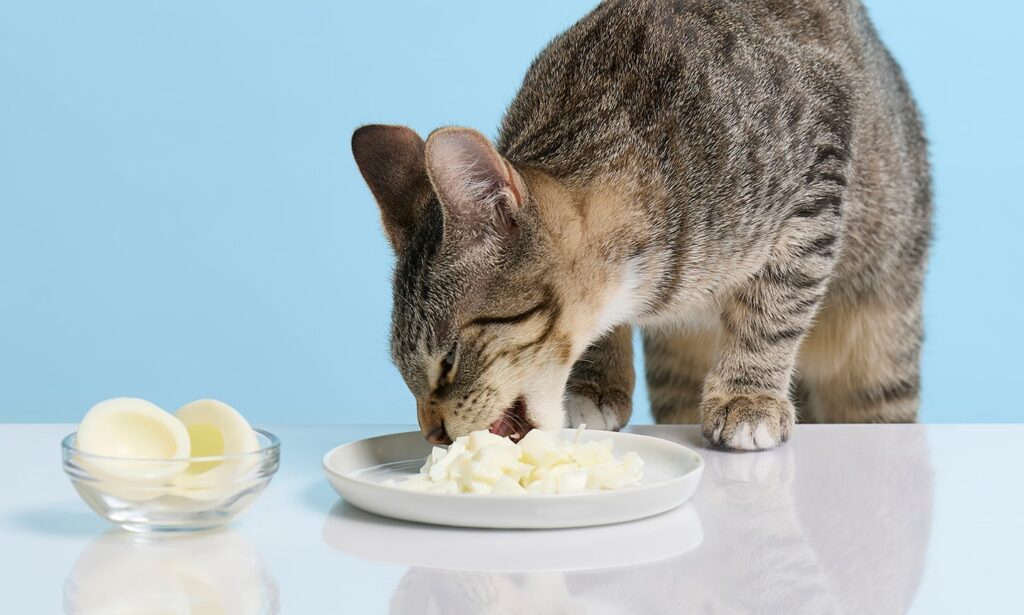
Commercial Cat Food vs. Eggs
While eggs can be a beneficial addition to a cat’s diet, it is important to consider how they compare to commercial cat food in terms of protein quality, overall nutrient profile, cost, and availability.
Protein Quality
Both commercial cat food and eggs can provide high-quality protein for cats. However, commercial cat food is specifically formulated to meet a cat’s nutritional requirements, including adequate protein intake. It is important to choose a reputable brand of cat food that uses high-quality protein sources to ensure your cat’s nutritional needs are met.
Overall Nutrient Profile
Commercial cat food is formulated to provide a well-balanced diet that includes all the necessary nutrients for cats. It is designed to meet their specific dietary requirements, including the right balance of proteins, fats, carbohydrates, vitamins, and minerals. While eggs can provide certain nutrients, they may not provide a complete and balanced diet on their own.
Cost and Availability
Eggs are generally more affordable and widely available compared to commercial cat food. If you are on a budget or have limited access to cat food, including eggs in your cat’s diet can be a cost-effective and convenient option. However, it is important to still provide a well-balanced diet that includes a variety of nutrient-rich foods.
Feeding Guidelines for Eggs
When feeding eggs to your cat, it is important to follow proper feeding guidelines to ensure they are getting the right amount and frequency.
Proper Portion Sizes
The appropriate portion size of eggs for your cat will depend on their size, age, and overall health. As a general guideline, you can consider giving your cat about one egg per week. However, it is important to monitor your cat’s weight and consult with your veterinarian to determine the appropriate portion size for your specific cat.
Frequency of Feeding
Feeding eggs to your cat should be done in moderation. Since eggs are high in fat and cholesterol, it is important to avoid overfeeding. Feeding eggs once or twice a week, in addition to a well-balanced commercial cat food diet, can be a suitable frequency for most cats.
Introducing Eggs to a Cat’s Diet
When introducing eggs to your cat’s diet, it is important to do so gradually. Start by adding a small amount of cooked egg to your cat’s food and monitor their response. If your cat shows any signs of gastrointestinal upset or allergic reactions, discontinue feeding eggs and consult with your veterinarian.
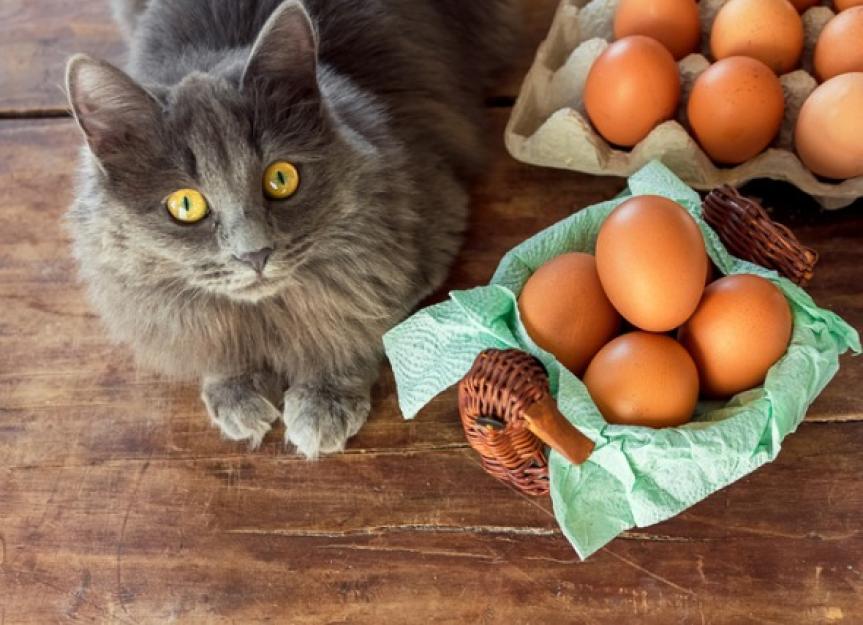
Possible Health Benefits of Eggs
Including eggs in your cat’s diet can potentially offer various health benefits.
Coat and Skin Health
The high-quality protein and essential fatty acids found in eggs can contribute to a healthy coat and skin in cats. These nutrients help maintain the elasticity and shine of the coat, reduce dandruff, and minimize skin allergies.
Improved Digestion
Eggs are easily digestible and can aid in maintaining a healthy digestive system in cats. The proteins in eggs are broken down more efficiently, making them easier for cats to absorb and utilize. This can lead to improved digestion and nutrient absorption.
Eye Health
The presence of taurine in eggs is crucial for supporting eye health in cats. Taurine is essential for maintaining proper vision and can help prevent eye-related issues. Including eggs in your cat’s diet can contribute to their overall eye health.
Potential Risks & Side Effects
While eggs can offer health benefits, it is important to be aware of potential risks and side effects associated with feeding eggs to cats.
Allergic Reactions
Some cats may be allergic to eggs and can experience allergic reactions when consuming them. Allergies can manifest as skin irritations, itching, swelling, or gastrointestinal upset. If your cat shows any signs of an allergic reaction after consuming eggs, discontinue feeding them and consult with your veterinarian.
Foodborne Illness
Feeding raw or undercooked eggs can expose cats to the risk of foodborne illnesses such as salmonella. Cats are more resistant to salmonella compared to humans, but it can still cause illness. To minimize the risk, it is important to handle eggs safely and thoroughly cook them before feeding them to your cat.
Nutrient Deficiencies
Feeding eggs in excess or as the primary source of protein can lead to nutrient deficiencies in cats. While eggs are a good source of protein and other nutrients, they may not provide a complete and balanced diet on their own. It is important to supplement eggs with other protein sources and provide a balanced commercial cat food to ensure your cat’s nutritional needs are met.
Weight Gain
Eggs are high in fat and calories, so overfeeding can contribute to weight gain in cats. It is important to monitor your cat’s weight and body condition and adjust the portion size accordingly. If your cat is overweight or prone to weight gain, consult with your veterinarian for proper feeding guidelines.
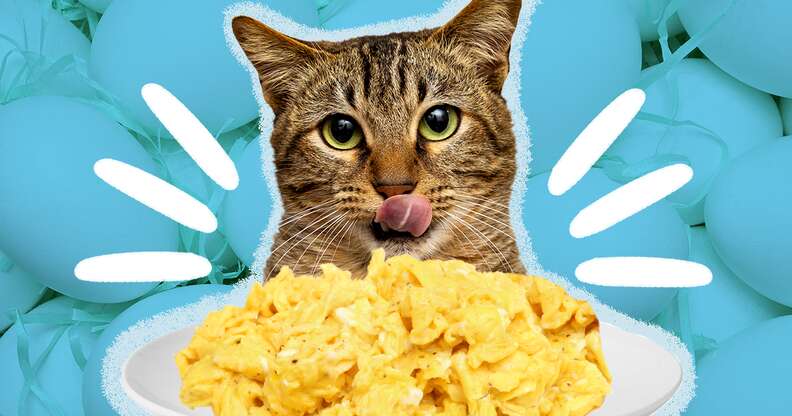
Egg Alternatives in Cat Food
If you prefer not to include eggs in your cat’s diet, there are various protein alternatives available in commercial cat food.
Chicken
Chicken is a common protein source in cat food and can provide high-quality protein for cats. It is easily digestible and generally well-tolerated by cats. Look for cat food products that list chicken as the main ingredient to ensure your cat is getting a sufficient amount of protein.
Fish
Fish, such as salmon or tuna, can also be a good protein source for cats. Fish is rich in omega-3 fatty acids, which can contribute to a healthy coat and skin. However, it is important to choose fish-based cat food that is free from bones and carefully sourced to avoid any potential contaminants.
Other Meat Sources
Cat food may also include other meat sources such as turkey, beef, or lamb. These meats can provide a variety of essential nutrients and proteins for cats. When choosing cat food, opt for products that contain high-quality, named meat sources to ensure your cat is receiving the necessary nutrients.
FAQs About Cats and Eggs
Here are some frequently asked questions about cats and eggs:
Can cats eat the egg yolk?
Yes, cats can eat the egg yolk. The egg yolk contains fats, vitamins, and minerals that are beneficial for cats. However, it is important to ensure that the egg yolk is fully cooked to avoid the risk of salmonella contamination.
Can cats eat scrambled eggs?
Yes, cats can eat scrambled eggs. Scrambled eggs are a safe and convenient way to feed eggs to your cat. Ensure that the eggs are fully cooked and avoid adding any seasonings, oils, or butter.
What to do if my cat has an allergic reaction to eggs?
If your cat shows signs of an allergic reaction after consuming eggs, such as skin irritations or gastrointestinal upset, it is important to discontinue feeding them eggs. Consult with your veterinarian for further guidance and to explore alternative protein sources for your cat’s diet.
In conclusion, eggs can be a valuable addition to a cat’s diet, providing high-quality protein, essential nutrients, and potential health benefits. However, it is important to consider the quality of egg protein, the amino acid profile, the difference between egg whites and egg yolks, and proper cooking methods. Commercial cat food remains the best option for meeting a cat’s overall dietary requirements, but including eggs as an occasional treat or supplement can contribute to a well-balanced diet. It is crucial to monitor your cat’s health, follow proper feeding guidelines, and consult with your veterinarian for personalized advice.
